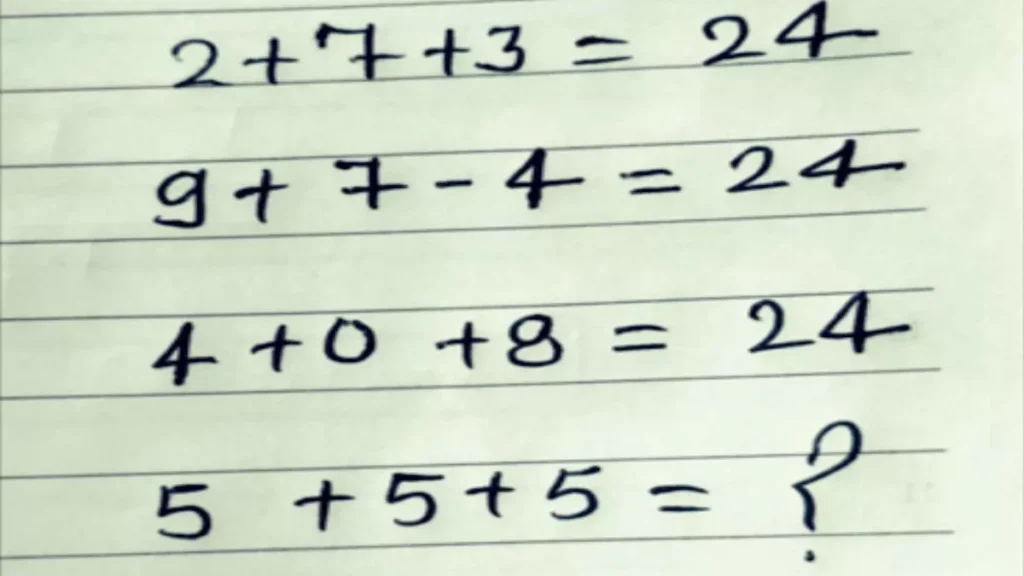A Math Game That Intrigues the Internet
A math game has recently captivated internet users with its rather unusual equations. Math puzzles are making a sensation online once again, fascinating users with complex equations that yield unexpected solutions.
At first glance, these riddles seem simple, but they often hide subtleties that challenge your skills beyond mere arithmetic: they also test your logic, observational skills, and ability to spot hidden patterns.
If you enjoy stimulating your brain with number games, a new teaser is currently making the rounds online—and it could give you quite a challenge.
The Mathematical Challenge That Everyone Is Talking About
A puzzle recently shared by the account @jitendra789789 has caught the attention of logic puzzle enthusiasts.
Here is the riddle shared:
2 + 7 + 3 = 24
9 + 7 – 4 = 24
4 + 0 + 8 = 24
5 + 5 + 5 = ?
At first glance, these operations appear to follow the classical rules of arithmetic. However, a closer examination reveals a hidden pattern that prompts us to rethink our approach.
Internet users have responded en masse, offering varied solutions: some view it as a simple calculation exercise, while others suspect a subtle trap or an alternative logic.
A Previous Riddle That Confused the Internet
This isn’t the first time such a puzzle has generated excitement (and sometimes frustration) online.
A previous challenge shared on social media claimed that “90% of people fail” to solve it correctly. Here’s the statement:
Your Turn: Can You Find the Solution?
These riddles remind us how easily our brains can be deceived by simple appearances.
The key is often to think differently, even to step outside the classic framework of arithmetic.
So, what do you think of this riddle? Take a moment, closely observe the numbers, and try to spot the hidden pattern.
The answer might be more surprising than you expect…
The Fascination With Puzzles Remains Strong
The appeal of mathematical riddles continues to grow.
Students, professionals, and curious minds of all ages dive in, sharing their hypotheses, reasoning, and sometimes their frustrations.
Beyond the challenge, it’s the joy of the “Eureka!” moment that drives everyone to tackle these little mental challenges.
And you, will you be among those who find the right answer?
Puzzle 1:
“2 + 7 + 3 = 24”
“9 + 7 – 4 = 24”
“4 + 0 + 8 = 24”
“5 + 5 + 5 = ?”
Analysis
At first glance, these equations seem incorrect if taken literally. For example:
- 2 + 7 + 3 = 12, not 24.
- 9 + 7 – 4 = 12, not 24 either.
- 4 + 0 + 8 = 12, once again.
But what’s happening here?
What if, instead of giving a true mathematical result, we doubled the total?
Solution
2 + 7 + 3 = 12 → 12 × 2 = 24
9 + 7 – 4 = 12 → 12 × 2 = 24
4 + 0 + 8 = 12 → 12 × 2 = 24
So, the rule appears to be:
Perform the calculation as usual, then multiply the result by 2.
Final line:
- 5 + 5 + 5 = 15 → 15 × 2 = 30
Answer: 30
Puzzle 2:
“1 + 1 + 1 + 1 + 1”
“1 + 1 + 1 + 1 + 1”
“1 + 1 × 0 + 1 = ?”
🔍 Analysis
This riddle relies on a classic trap: the order of mathematical operations (or operator precedence).
The last line is:
1 + 1 × 0 + 1
According to mathematical rules (PEMDAS/BODMAS):
- Multiplications are done before additions.
Steps:
1 × 0 = 0
We replace: 1 + 0 + 1
1 + 0 + 1 = 2
But be careful, the phrase stated that the two previous lines were also additions:
1 + 1 + 1 + 1 + 1 = 5
1 + 1 + 1 + 1 + 1 = 5
And now, 1 + 1 × 0 + 1 = 2
Answer: 2
And remember, if you don’t want to keep having fun with tests and challenges, definitely do not click here.

